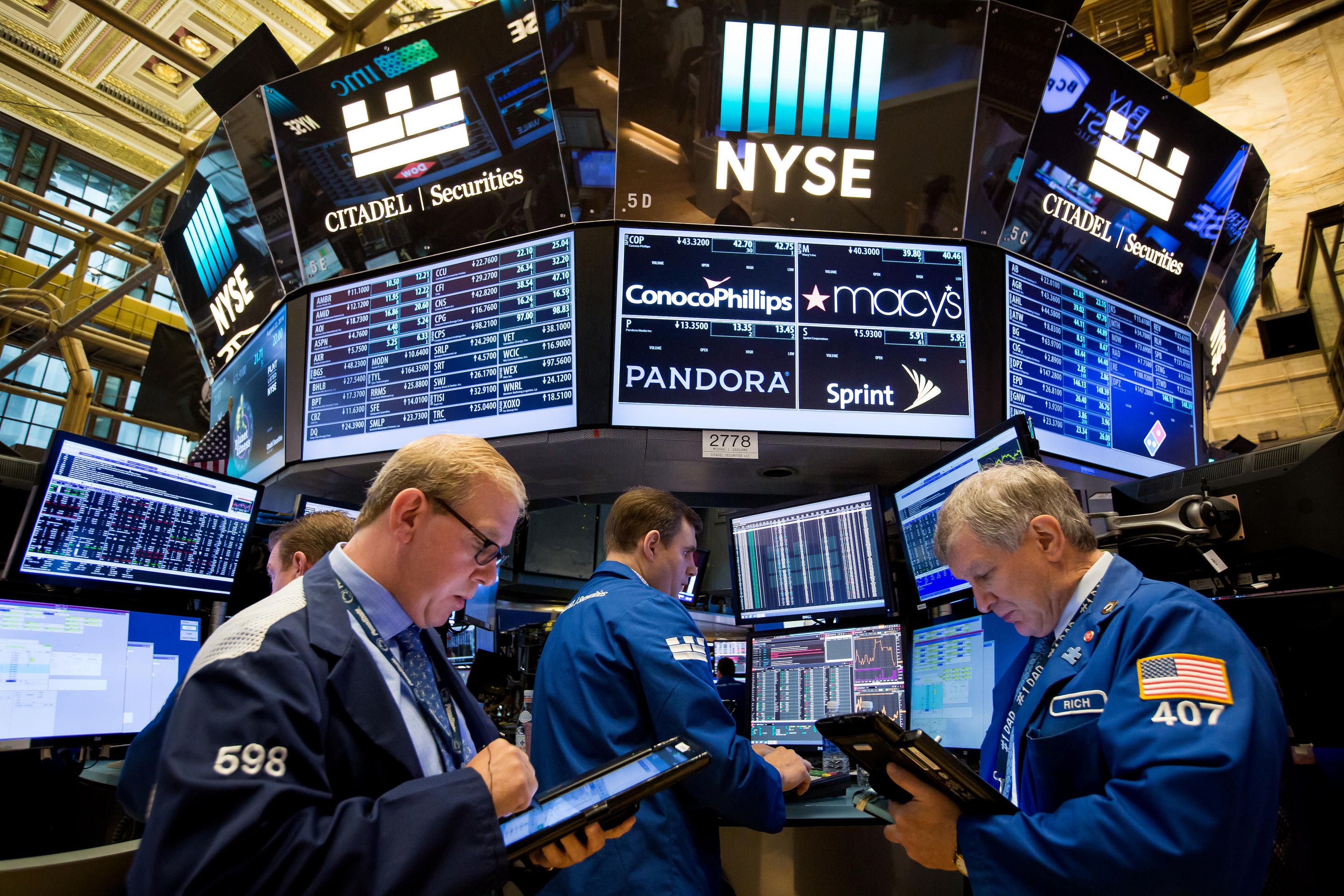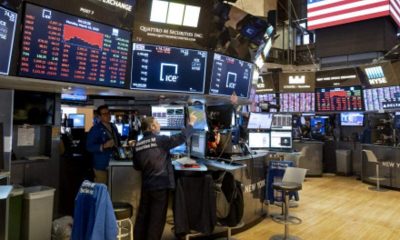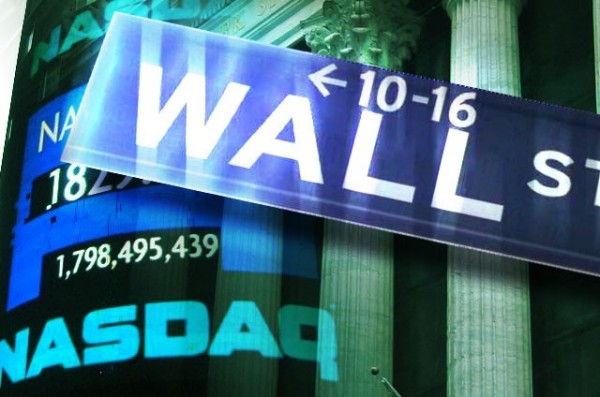Economy
US Stocks Open Higher on Easing Trade Concerns

By Investors Hub
The major U.S. index futures are pointing to a modestly higher opening on Tuesday, with stocks likely to attempt another rebound after turning lower over the course of the previous session.
The upward momentum on Wall Street comes after the downturn seen on Monday dragged the Nasdaq and the S&P 500 down to six-month closing lows and the Dow fell to its lowest closing level in well over three months.
Traders may once again look to pick up stocks at reduced levels after bargain hunting efforts in the previous session were thwarted by renewed concerns about the trade war between the U.S. and China.
President Donald Trump?s prediction the U.S. will reach a ?great deal? with China on trade may offset some of the concerns, although the president warned of more tariffs if a deal is not possible.
?I think that we will make a great deal with China and it has to be great, because they?ve drained our country,? Trump told Laura Ingraham of Fox News on Monday.
After failing to sustain an early move to the upside, stocks came under pressure over the course of the trading session on Monday. The major averages pulled back well off their best levels of the day and into negative territory.
While the major averages regained some ground going into the close, they remained firmly in the red. The Dow slumped 245.39 points or 1 percent to 24,442.92, the Nasdaq tumbled 116.92 points or 1.6 percent to 7,050.29 and the S&P 500 fell 17.44 points or 0.7 percent to 2,641.25.
The sharp pullback by stocks came after report from Bloomberg said the U.S. is preparing to announce tariffs on all remaining Chinese imports if next month’s talks between Presidents Donald Trump and Xi Jinping fail to ease the trade war.
Citing three people familiar with the matter, Bloomberg said the announcement of the new round of tariffs could come by early December
Two of the people told Bloomberg the new tariffs would apply to Chinese imports that aren’t already covered by previous rounds of tariffs, or approximately $257 billion worth of goods.
The report from Bloomberg comes as Trump and Xi are expected to meet on the sidelines of a Group of 20 summit in Buenos Aires, Argentina, beginning November 30th.
Shortly before imposing tariffs on $200 billion worth of Chinese goods in September, Trump threatened to levy duties on nearly everything China exports to the U.S.
The early strength on Wall Street came as some traders picked up stocks at reduced levels following the steep drop seen last week, extending the see-saw performance seen over the past few sessions.
Auto stocks helped to lead the way higher after a report from Bloomberg said China is considering cutting a tax on car purchases in half.
The proposal to lower the purchase tax to 5 percent from 10 percent comes as Chinese car sales are on track for their first annual drop in two decades amid the U.S.-China trade war.
News on the merger-and-acquisition front also generated some buying interest, with IBM Corp. (IBM) agreeing to acquire Linux software distributor Red Hat (RHT) for $33 billion in cash.
Buying interest waned over the course of the morning, however, with political uncertainty in Europe limiting the upside for the markets.
Meanwhile, traders largely shrugged off a report from the Commerce Department showing personal income rose by slightly less than expected in the month of September.
Oil service stocks bucked the early uptrend by the markets and saw further downside as the day progressed. The Philadelphia Oil Service Index plummeted by 4.3 percent to its lowest closing level in well over nine years.
Weatherford (WFT) led the oil service sector lower after reporting a narrower than expected third quarter loss but revenues that came in below estimates.
The sell-off by oil service stocks reflected weakness throughout the energy sector, as the price of crude oil fell sharply in electronic trading.
Significant weakness also emerged among retail stocks, as reflected by the 1.9 percent slump by the Dow Jones Retail Index. With the drop, the index fell to a nearly five-month closing low.
Computer hardware, biotechnology, and networking stocks also came under pressure over the course of the session, while interest rate-sensitive utilities, banking, and commercial real estate stocks ended the day on the upside.
Economy
Shettima Blames CBN’s FX Intervention for Naira Depreciation

By Adedapo Adesanya
Vice President Kashim Shettima has attributed the Naira’s recent depreciation to the intervention of the Central Bank of Nigeria (CBN) in the foreign exchange (FX) market, stating that the currency could have strengthened to around N1,000 per Dollar within weeks if the apex bank had allowed market forces to prevail.
The local currency has dropped over N8.37 on the Dollar in the last week, as it closed at N1,355.37/$1 on Tuesday at the Nigerian Autonomous Foreign Exchange Market (NAFEM), after it went on a spree late last month and into the early weeks of February.
However, speaking on Tuesday at the Progressive Governors’ Forum (PGF), Renewed Hope Ambassadors Strategic Summit in Abuja, the Nigerian VP said the intervention was to ensure stability.
“In fact, if not for the interventions by the Central Bank of Nigeria yesterday, the 1,000 Naira to a Dollar we are going to attain in weeks, not in months. But for the purpose of market stability, the CBN generously intervened yesterday.
“So, for some of my friends, especially one of our party leaders who takes delight in stockpiling dollars, it is a wake-up call,” the vice president said.
He was alluding to CBN buying US Dollars from the market to slow down the rapid rise of the Naira.
Latest information showed that last week, the apex bank bought about $189.80 million to reduce excess Dollar supply and control how fast the Naira was gaining value.
The move was aimed at preventing foreign portfolio investors from exiting Nigeria’s fixed-income market, as large-scale sell-offs could heighten demand for US Dollars, intensify capital flight, and exert further pressure on the exchange rate.
Amid this, speaking after the 304th meeting of the monetary policy committee (MPC) of the CBN on Tuesday, Governor of the central bank, Mr Yemi Cardoso, said Nigeria’s gross external reserves have risen to $50.45 billion, the highest level in 13 years.
This strengthens the country’s foreign exchange buffers, enhances the apex bank’s capacity to defend the Naira when needed, and boosts investor confidence in the stability of the Nigerian FX market.
Economy
Dangote Refinery Exports 20 million Litres Surplus of PMS

By Aduragbemi Omiyale
Up to 20 million litres in surplus of Premium Motor Spirit (PMS), otherwise known as petrol, is being exported daily by the Dangote Petroleum Refinery and Petrochemicals after supplying about 65 million litres to the domestic market.
Nigeria’s average daily petrol consumption stands at between 50 and 60 million litres, indicating that the refinery’s output exceeds current domestic requirements, marking a decisive break from decades of fuel import dependence and recurrent scarcity.
The president of Dangote Group, Mr Aliko Dangote, speaking in Lagos, while confirming a structured offtake agreement with selected marketers to ensure nationwide distribution and eliminate supply instability, said the structured model was designed to eliminate supply bottlenecks and curb speculative practices that have historically triggered disruptions.
“We have agreed an offtake framework to supply up to 65 million litres daily for the domestic market. Any surplus, estimated at between 15 and 20 million litres, will be exported,” he said.
Under a revised distribution framework endorsed by the Nigerian Midstream and Downstream Petroleum Regulatory Authority, the refinery will channel nationwide supply through major marketing companies, including MRS Oil Nigeria Plc, Nigerian National Petroleum Company Limited Retail (NNPC), 11 plc (Mobil Producing Nigeria), TotalEnergies Marketing Nigeria Plc, Rainoil Limited, Northwest Petroleum & Gas Company Limited, Ardova Plc, Bovas & Company Limited, AA Rano Nigeria Limited, AYM Shafa Limited, Conoil and Masters Energy.
With local refining now exceeding national demand, the country stands to conserve billions of dollars annually in foreign exchange previously spent on petrol imports. Analysts say this would ease pressure on the naira, strengthen external reserves, and improve trade balance stability.
Economy
NECA, CPPE Laud CBN’s 0.50% Interest Rate Cut

By Adedapo Adesanya
The Nigeria Employers’ Consultative Association (NECA) and the Centre for the Promotion of Private Enterprise (CPPE) have separately commended the Central Bank of Nigeria (CBN) for reducing the Monetary Policy Rate (MPR) from 27.0 per cent to 26.5 per cent at its 304th Monetary Policy Committee (MPC) meeting.
In reaction, NECA Director-General, Mr Adewale-Smatt Oyerinde, praised the decision in a statement, noting that the 50 basis-point cut is “a cautious but noteworthy signal” that authorities were responding to sustained pressures on businesses.
He said the marginal reduction might not immediately lower lending rates, but reflected “a gradual shift toward supporting growth without undermining price stability”.
According to him, the overall stance remained tight, with the Cash Reserve Ratio retained at 45 per cent and the liquidity ratio at 30 per cent.
He added that the asymmetric corridor around the MPR was also maintained, reinforcing a cautious monetary approach.
“With a substantial portion of deposits still sterilised, banks’ capacity to expand credit to the real sector may remain constrained in the near term,” he said.
Mr Oyerinde described the move as “a careful balancing act” aimed at moderating inflation without worsening pressures on businesses.
He noted that firms continued to grapple with high operating costs, exchange rate volatility and weakened consumer demand.
“Inflation, particularly in food, energy and transportation, remains a significant challenge to employers and households,” he said.
He stressed that the modest easing must be supported by coordinated fiscal and structural reforms to address supply-side constraints.
Such reforms, he said, should improve infrastructure and enhance productivity across key sectors of the economy.
Mr Oyerinde urged financial institutions to ensure the MPR reduction was gradually reflected in lending conditions for manufacturers and SMEs.
He affirmed that although the MPC had not fully relaxed its tightening stance, the rate cut signalled cautious optimism.
“Sustained improvements in inflation, exchange rate stability and investor confidence will determine scope for further easing that supports growth and employment,” he said.
On its part, the CPPE said the decision reflected improving macroeconomic fundamentals and a cautious shift from aggressive tightening.
The organisation noted that sustained disinflation, stronger external reserves, an improved trade balance and relative exchange-rate stability had created room for monetary easing.
It said the rate cut could boost investor confidence and support private-sector growth, but cautioned that weak monetary transmission might limit its impact on lending rates.
The CPPE identified high cash reserve requirements, elevated lending rates, government borrowing and structural banking costs as major constraints to effective transmission.
The group also stressed the need for fiscal consolidation, citing high public debt, persistent deficits and rising debt-service obligations as risks to macroeconomic stability.
According to the chief executive of CPPE, Mr Muda Yusuf, effective policy coordination and stronger transmission mechanisms were critical to unlocking investment and sustaining growth, lauding the CBN for what he described as a measured and data-driven policy adjustment.
The CPPE boss noted that the easing reflected strengthening macroeconomic performance, declining inflation, growing reserves, improved trade balance and enhanced foreign exchange stability.
Mr Yusuf added that for the benefits of monetary easing to be fully realised, authorities must strengthen transmission to ensure lower lending rates for the real sector and advance credible fiscal consolidation to safeguard stability.
He said that if supported by structural reforms and disciplined fiscal management, the current policy direction could unlock a stronger investment cycle and more durable economic growth.
-

 Feature/OPED6 years ago
Feature/OPED6 years agoDavos was Different this year
-
Travel/Tourism10 years ago
Lagos Seals Western Lodge Hotel In Ikorodu
-

 Showbiz3 years ago
Showbiz3 years agoEstranged Lover Releases Videos of Empress Njamah Bathing
-

 Banking8 years ago
Banking8 years agoSort Codes of GTBank Branches in Nigeria
-

 Economy3 years ago
Economy3 years agoSubsidy Removal: CNG at N130 Per Litre Cheaper Than Petrol—IPMAN
-

 Banking3 years ago
Banking3 years agoSort Codes of UBA Branches in Nigeria
-

 Banking3 years ago
Banking3 years agoFirst Bank Announces Planned Downtime
-

 Sports3 years ago
Sports3 years agoHighest Paid Nigerian Footballer – How Much Do Nigerian Footballers Earn















